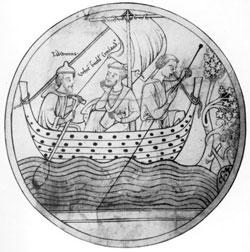
Feastday: July 30
Birth: 670
Death: 734
Archbishop of Canterbury from 731. Probably from Mercia, England, he became a monk at Bredon, and eventually was named archbishop of Canterbury in succession to Brithwald. Respected by St. Bede, he was the author of several works, including a grammar and riddles.
8th-century Anglo-Saxon Archbishop of Canterbury, saint, and writerTatwine (c. 670–734) was the tenth Archbishop of Canterbury from 731 to 734. Prior to becoming archbishop, he was a monk and abbot of a Benedictine monastery. Besides his ecclesiastical career, Tatwine was a writer, and riddles he composed survive. Another work he composed was on the grammar of the Latin language, which was aimed at advanced students of that language. He was subsequently considered a saint.
Biography
Tatwine was a Mercian by birth. His epigraph at Canterbury stated that when he died he was in old age, so perhaps he was born around 670. He became a monk at the monastery at Breedon-on-the-Hill in the present-day County of Leicestershire, and then abbot of that house. Through the influence of King Æthelbald he was appointed as Archbishop of Canterbury in 731 and was consecrated on 10 June 731. He was one of a number of Mercians who were appointed to Canterbury during the 730s and 740s. Apart from his consecration of the Bishops of Lindsey and Selsey in 733, Tatwine's period as archbishop appears to have been uneventful. He died in office on 30 July 734. Later considered a saint, his feast day is 30 July.
Writings
Bede's commentary on Tatwine calls him a "vir religione et Prudentia insignis, sacris quoque literis nobiliter instructus" (a man notable for his prudence, devotion and learning). These qualities were displayed in the two surviving manuscripts of his riddles and four of his Ars Gramattica Tatuini. The Ars is one of only two surviving eighth-century Latin grammars from England, and was based on the works of Priscian and Consentius. The riddles deal with such diverse topics as philosophy and charity, the five senses and the alphabet, and a book and a pen. Tatwine gives a sign in one of the riddles of the growing acceptance among scholars in the Christian west of the legitimacy of philosophy: "De philosophia: est felix mea qui poterit cognoscere iura" (Of Philosophy: happy is he who can know my laws). The riddles are formed in acrostics. The grammar is a reworking of Donatus's Ars Minor with the addition of information drawn from other grammarians. It was not designed for a newcomer to the Latin language, but is designed for more advanced students. It covers the eight parts of speech through illustrations drawn from classical scholars, although not directly but through other grammatical works. There are also some examples drawn from the Psalms. The work was completed before he became archbishop, and was used not only in England but also on the continent. A recent edition of his works is Tatuini Opera omnia, published in 1968 with some translations into English and German from the original Latin.
Notes
- ^ Sometimes Tatwin, Tatuini, or Tadwinus
Citations
- ^ Farmer Oxford Dictionary of Saints pp. 492–493
- ^ Hutchison-Hall Orthodox Saints of the British Isles p. 81
- ^ Brooks Early History of the Church of Canterbury p. 80
- ^ Lapidge "Tatwine" Oxford Dictionary of National Biography
- ^ Yorke Kings and Kingdoms p. 31
- ^ Stenton Anglo-Saxon England p. 183
- ^ Fryde, et al. Handbook of British Chronology p. 213
- ^ Kirby Earliest English Kings p. 113
- ^ Williams Kingship and Government p. 24
- ^ Walsh New Dictionary of Saints p. 571
- ^ Law "Transmission" Revue d'Histoire des Textes p. 281
- ^ 'Aenigmata Tatvini', ed. by Fr. Glorie, trans. by Erika von Erhardt-Seebold, in Tatuini omnia opera, Variae collectiones aenigmatum merovingicae aetatis, Anonymus de dubiis nominibus, Corpus christianorum: series latina, 133-133a, 2 vols (Turnholt: Brepols, 1968), I 165-208. 1. de philosophia/philosophy; 2. de spe, fide (et) caritate; hope, faith (and) charity; 3. de historia et sensu et morali et allegoria/historical, spiritual, moral, and allegorical sense; 4. de litteris/letters; 5. de membrano/parchment; 6. de penna/pen; 7. de tinti(n)no/bell; 8. de ara/altar; 9. de cruce Xristi/Christ's cross; 10. de recitabulo/lectern; 11. de acu/needle; 12. de patena/paten; 13. de acu pictili/embroidery needle; 14. de caritate/love; 15. de niue, grandine et glacie/snow, hail and ice; 16. de pr(a)epositione utriusque casus/prepositions with two cases; 17. de sciuro/squirrel; 18. de oculis/eyes; 19. de strabis oculis/squinting eyes; 20. de lusco/the one-eyed; 21. de malo/evil; 22. de Adam/Adam; 23. de trina morte/threefold death; 24. de humilitate/humility; 25. de superbia/pride; 26. de quinque sensibus/the five senses; 27. de forcipe/a pair of tongs; 28. de incude/anvil; 29. de mensa/table; 30. de ense et uagina/sword and sheath; 31. de scintilla/spark; 32. de sagitta/arrow; 33. de igne/fire; 34. de faretra/quiver; 35. de pru(i)na/ember; 36. de uentilabro/winnowing fork; 37. de seminante/sower; 38. de carbone/charcoal; 39. de coticulo/whetstone; 40. de radiis solis/rays of the sun.
- ^ Rory Naismith, Antiquity, Authority, and Religion in the Epitomae and Epistolae of Virgilius Maro Grammaticus' Peritia v.20 (2008) 59, at 66.
- ^ Lapidge "Tatwine" Blackwell Encyclopedia of Anglo-Saxon England
- ^ Brooks Early History of the Church of Canterbury pp. 98–99
- ^ Blair World of Bede pp. 246–247
- ^ World Cat "Tatuini Opera omnia" World Cat Catalogue





